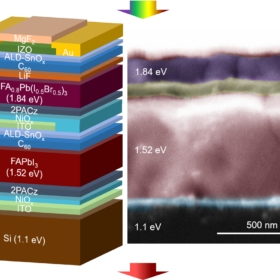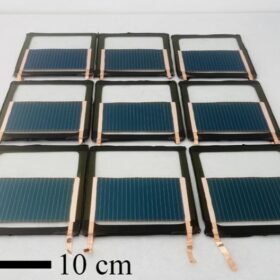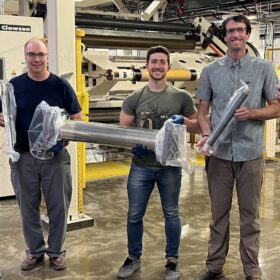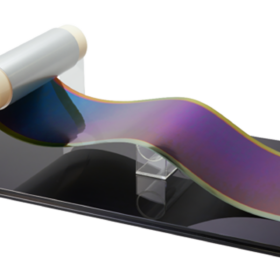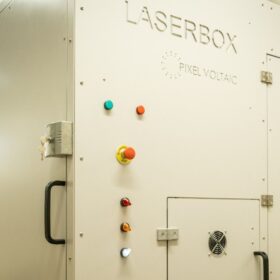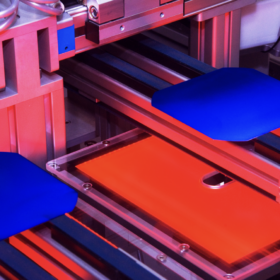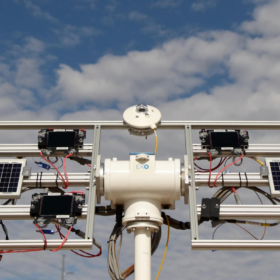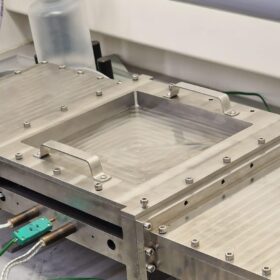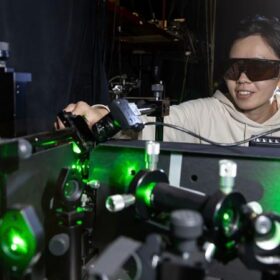Triple-junction perovskite–perovskite–silicon solar cell achieves record-breaking efficiency of 24.4%
Developed by scientists in Germany, the triple-junction cell is based on a perovskite top cell with an energy bandgap of 1.84 eV, a perovskite middle cell with bandgap of 1.52 eV, and a silicon bottom cell with a bandgap of 1.1 eV. The device achieved an open-circuit voltage of 2.84 V, a short-circuit current of 11.6 mA cm–2, and a fill factor of 74%.
US researchers develop 108 cm2 perovskite solar module with 19.21% efficiency
The scientists built the panel with perovskite solar cells treated with trifluoromethane sulfonate to combat iodide defects. The mini module reportedly achieved the highest efficiency ever recorded for its size to date, with the result being confirmed by the US National Renewable Energy Laboratory (NREL).
U.S. startup advances solar perovskite thin film roll-to-roll coating
Verde Technologies, a U.S.-based spinoff of the University of Vermont specializing in single junction and all thin-film tandem perovskite solar technologies, has demonstrated that its coating processes are transferable to existing commercial roll-to-roll manufacturing lines in a project with compatriot manufacturer Verico Technology.
Merida Aerospace developing perovskite PV cells for space
Merida Aerospace, a US aerospace company, is developing perovskite solar cells for low-Earth-orbit satellites. It says perovskite solar cells could be a more cost-effective and efficient option than traditional cells.
Sekisui Chemical to open solar module factory in Slovakia
Denisa Sakova, Slovakia’s Deputy Prime Minister and Minster of Economy, has signed an agreement with Japanese plastics manufacturer Sekisui Chemical, which is developing flexible photovoltaic panels. Sakova says the aim is to explore the possibility of producing the panels in Slovakia.
Laser-assisted hermetic encapsulation tech for perovskite PV modules
Pixel Voltaic, a spinoff of University of Porto, has launched a laser system to hermetically seal glass-glass and glass-steel perovskite PV modules up to 30 cm x 30 cm. The company’s technology roadmap is to increase capacity to accommodate larger device areas of up to 1 m2, and to modify the process to operate within a roll-to-roll line.
CubicPV halts plans for US solar silicon wafer factory
CubicPV has halted its plans to build a US solar silicon wafer factory, as it has shifted its focus to producing perovskite tandem modules.
US startup developing perovskite-silicon tandem panels with 26% efficiency
Tandem PV has secured capital to advance its four-terminal perovskite-silicon tandem module technology and move closer to first manufacturing. The company claims its products maintain 80% of the initial performance after 25 years.
Aerosol process to boost perovskite solar cell performance
Aerosolar, a spinoff from the Queen Mary University of London, has created a novel aerosol method that it claims boosts efficiency and stability of metal halide perovskite solar cells.
‘Shallow defects’ key to high efficiency of perovskite solar cells, say researchers
Researchers at the Jülich Research Center in Germany have used novel photoluminescence measurements to analyze the recombination of charge carriers in perovskite solar cells. They have found that the loss of charge carriers in perovskite devices works differently from other types of PV cells.
